Published Books
Revision, Acceptability and Context: Theoretic and Algorithmic Aspects
 An important aspect in the formalisation of common-sense reasoning is the construction of a model of what an agent believes the world to be like to help in her reasoning process. This model is often incomplete or inaccurate, but new information can be used to refine it. The study of techniques that achieve this in a rational way is the task of the discipline of belief revision, with which this book is concerned.
An important aspect in the formalisation of common-sense reasoning is the construction of a model of what an agent believes the world to be like to help in her reasoning process. This model is often incomplete or inaccurate, but new information can be used to refine it. The study of techniques that achieve this in a rational way is the task of the discipline of belief revision, with which this book is concerned.
There are three key elements to the book's approach. Firstly, the methodology of logic by translation. A specific instance of this is the idea of revision by translation. Revision for a foreign logic is done via its translation into a well-known logic, usually classic logic. Secondly, the technique of meta-level/object-level movement, where we bring some operation defined at the meta-level of a logic into its object level. In this book, we bring the operation of deletion to the object level. Finally, through Labelled Deductive Systems, we use the context of the revision to finetune its operation and illustrate the idea through the presentation of various algorithms.
The book is suitable for researchers and postgraduates in the areas of artificial intelligence, database theory, and logic.
Elementary Logic with Applications
 Elementary Logic with Applications is written for undergraduate logic and logic programming courses. Logic has been applied to a wide variety of subjects such as software engineering and hardware design, to programming and artificial intelligence. In this way, it has served to stimulate the search for clear conceptual foundations.
Elementary Logic with Applications is written for undergraduate logic and logic programming courses. Logic has been applied to a wide variety of subjects such as software engineering and hardware design, to programming and artificial intelligence. In this way, it has served to stimulate the search for clear conceptual foundations.
Recently many extensions of classical logic such as temporal, modal, relevance, fuzzy and non-monotonic logics have been widely used in computer science, therefore requiring a new formulation of classic logic which can be modified to yield the effect of non-classical logics.
This text aims to introduce classical logic in such a way that one can easily deviate into discussing non-classical logics. It defines a number of different types of logics and the differences between them, starting with the basic notions of the most common logic.
Elementary Logic with Applications develops a theorem prover for classical logic in a way that maintains a procedural point of view and presents the reader with the real challenges facing applied logic.
Dov Gabbay and Odinaldo Rodrigues have been teaching logic and computer science for many years. Dov Gabbay has written numerous other titles on the subject of logic and is a world authority on non-classical logics. Odinaldo Rodrigues is widely known for his work on logic, belief revision and argumentation.
The “Elementary Logic with Applications” course is currently taught at the Department of Informatics, King's College London.